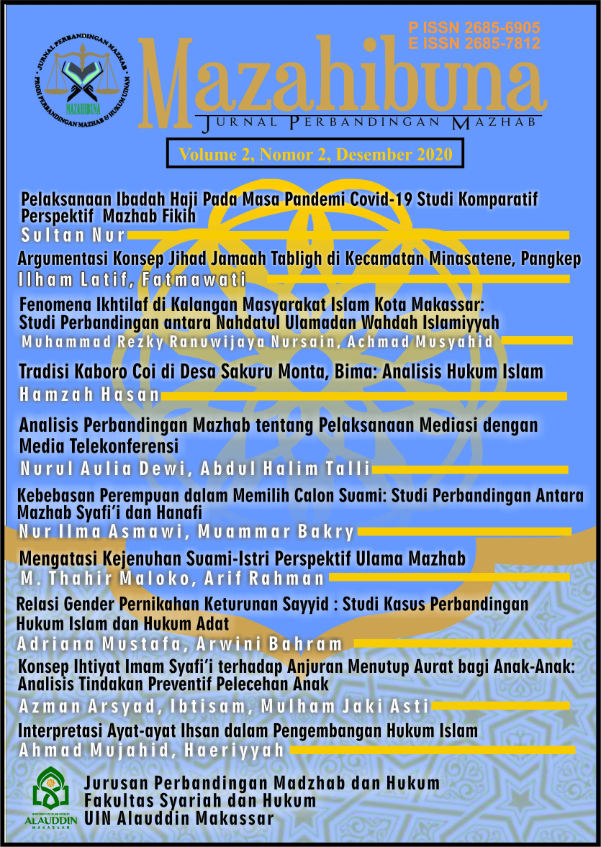Kebebasan Perempuan dalam Memilih Calon Suami; Studi Perbandingan Antara Mazhab Syafi’i Dan Hanafi
Abstract
The subject of this paper is how the freedom of women in choosing a potential husband. In general, ideas can be put forward in a society where the pattern of relationship is traditional, marriage is perceived as a social necessity which is part of the inherited social tradition. This study aims to find out how the views of the Shafi'i School and the Hanafi School of Women in choosing a husband. Whether choosing a husband candidate is a woman's absolute right or is there interference from parents. Where cases of matchmaking and the practice of forced marriage by parents of girls are still found in Indonesian society. Mazhab Syafi'i and the Hanafi School have different opinions about women's freedom to choose a husband. The Shafi'i school is of the opinion that a girl who is not yet an adult, in this case, according to him, he can marry the girl even without his permission. According to him, for a widow there must be clear consent from the person concerned. Meanwhile, according to the Hanafi School, the consent of a woman, either a widow or a girl, must be in the marriage and vice versa, if they refuse the marriage contract, it cannot be carried out
References
Abdul Qadir Manshur. Buku Pintar Fikih Wanita. Jakarta: Penerbit Zaman, 2012.
Abu Bakar ”Problem Kewenangan Wali dan Hak Perempuan dalam Penentuan Jodoh” vol.v.No.1.Juni 2010.
Agustin Hanapi, “Peran Perempuan Dalam Islam”Vol.1, No.1, Maret 2015, h. 16-17
Helmi Karim, “Kedewasaan untuk Menikah”, dalam Chuzaimah T. Yanggo dan H.A. Hafiz Anshory A.Z, Problematika Hukum Islam Kontenporer. Yogyakarta: Pustaka Firdaus, 1996.
https://bincangsyariah.com/nisa/bolehkah-menolak-perjodohan-orangtua/
https://carihadis.com/Shahih_Bukhari/4700
J.N.D Anderson, Hukum Islam di Dunia Modern, penerjemah Machnun Husein .Yogyakarta : PT. Tiara Wacana, 1994.
Lilik Ummi Kaltsum, “Rethinking hak-hak perempuan dalam pernikahan” vol.6,No.2,2013.
Muhammad Kudhori, ”Hak Perempuan dalam Memilih Suami(Telaah Hadis Ijbar Wali)” vol 12,No1,2017, h. 21
Musthafa Kamal Pasha, Fikih Islam, (Yogyakarta: Citra Karsa Mandiri, 2003), h. 261
Nurhayati B, “Hak-hah Perempuan Menurut Perspektif Al-Qur’an” vol. 16,No.2,2017.
Naro, Wahyuddin, Abdul Syatar, Muhammad Majdy Amiruddin, Islamul Haq, Achmad Abubakar, and Chaerul Risal. “Shariah Assessment Toward the Prosecution of Cybercrime in Indonesia.” International Journal of Criminology and Sociology 9 (2020): 572–586. https://doi.org/10.6000/1929-4409.2020.09.5
Pasal 28B ayat (1) Undang-Undand Dasar 1945
Prof. Dr. Siti Musdah Mulia, MA, Kemuliaan Perempuan dalam Islam. Jakarta:Elex Media Komputindo, 2014.
Sudarwati D. Jupriono, “Betina, Wanita, Perempuan: Telaah Semantik Leksikal, Semantik Historis,Pragmatik”, vol.5,No. 1,July 1997, h. 5
https://www.tongkronganislami.net/kebebasan-wanita-dalam-memilih-pasangan/
Syatar, Abdul, and Achmad Abubakar. Filosofi ’Uqubah Islamiyah Versi Ramadhan Al-Buti; Relevansi Dengan Pemidanaan Dalam Sistem Hukum Indonesia. Gowa: Alauddin University Press, 2020.

This work is licensed under a Creative Commons Attribution 4.0 International License.
Authors who publish with Mazahibuna: Jurnal Perbandingan Mazhab agree to the following terms:
- Authors retain copyright and grant the Mazahibuna: Jurnal Perbandingan Mazhab right of first publication with the work simultaneously licensed under Creative Commons Attribution License (CC BY 4.0) that allows others to share the work with an acknowledgment of the work's authorship and initial publication in this journal.
- Authors can enter into separate, additional contractual arrangements for the non-exclusive distribution of the published version of the work (e.g., post it to an institutional repository or edit it in a book), with an acknowledgment of its initial publication in this journal.
- Authors are permitted and encouraged to post their work online (e.g., in institutional repositories or on their website) before and during the submission process, as it can lead to productive exchanges, as well as earlier and greater citation of published work.

